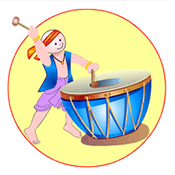
Dimdima
Online Children's Magazine from India

Dimdima
Online Children's Magazine from India
| Gandhiji Withdraws from Political Activities |
|
|
Hindu-Muslim unity was another obsession with Gandhi. The Khilafat movement lost
its relevance when in Turkey, Kamal Pasha forced the Sultan into exile and set
out to europeanize the country. Following these developments the brief honeymoon
between Hindus and Muslims so evident during the non-cooperation movement came
to an end. Hindu-Muslim clashes became more frequent. Small things like a Hindu
procession passing in front of a mosque at prayer time or a Muslim slaughtering
a cow could set off a communal riot. Gandhi decided to pray and fast to bring
the two communities closer. Announcing his intention on Sept. 18, 1924, Gandhiji
said in a statement: "Nothing evidently which I say or write can bring two
communities together and I am therefore imposing on myself a 21 day fast from
today... It is both a penance and a prayer..."
Gandhiji fasted at the home of Mohamed Ali. The two physicians in constant
attendance were Muslims. 'Charlie' Andrews who served as nurse was a Christian
missionary. On the twelfth day of the fast Gandhiji wrote in Young India,
"Hitherto it has been a struggle and a yearning for a change of heart among
Englishmen who compose the government of India. That change has still to come.
But the struggle must for the moment be transferred to a change of heart among
the Hindus and the Mussulmans. Before they dare think of freedom they must be
brave enough to love one another, to tolerate one another's religion, even
prejudices and superstitions, and to trust one another. This requires faith in
oneself. And faith in oneself is faith in God. If we have that faith we shall
cease to fear one another."
On October 6, on the completion of the 21-day fast Dr. Ansari offered him a
glass of orange juice which the Mahatma drank.
Gandhiji resumed his tours to propagate khadi. He refused to be drawn into
politics. He ignored the Simon Commission which arrived in India in February
1928 and did not even mention it in any of his speeches.
The Simon Commission was to tour India, talk to various leaders and suggest
changes in the Indian political system. No one in the country wanted to talk to
the commission which was supposed to determine the future of the country but had
no Indian as a member. Wherever it went the commission was greeted with black
flags. Many Indian leaders including Lala Lajpat Rai, Jawaharlal Nehru and
Gobind Ballab Pant received lathi blows while holding demonstrations against the
commission. Unfortunately Lajpat Rai succumbed to the injuries he received
during a lathi charge and this resulted in a violent backlash in the form of
revolutionary activities.
Dimdima is the Sanskrit word for ‘drumbeat’. In olden days, victory in battle was heralded by the beat of drums or any important news to be conveyed to the people used to be accompanied with drumbeats.
Bharatiya Vidya Bhavan
K. M Munshi Marg,
Chowpatty, Mumbai - 400 007
email : editor@dimdima.com
Bharatiya Vidya Bhavan
505, Sane Guruji Marg,
Tardeo, Mumbai - 400 034
email : promo@dimdima.com
Dimdima.com, the Children's Website of Bharatiya Vidya Bhavan launched in 2000 and came out with a Printed version of Dimdima Magazine in 2004. At present the Printed Version have more than 35,000 subscribers from India and Abroad.